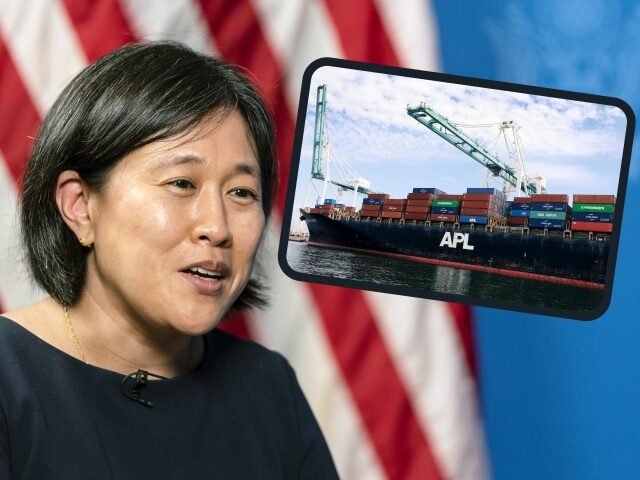Despite overwhelming pressure from President Joe Biden’s top globalists and multinational corporations, United States Trade Representative (USTR) Katherine Tai is keeping tariffs on billions worth of China-made goods while the duties are under review.
The tariffs, first imposed by President Trump in July 2018, are up for review by Tai.
Though she could have been swayed by Biden’s top globalists and the corporate lobby — both of which support the free trade consensus in Washington, D.C.’s beltway — Tai announced that the billions in Section 301 tariffs on China-made goods will remain in place while her office reviews whether to keep them for another four years.
“Today is a critical step forward to keeping the Section 301 China tariffs in place that are protecting U.S. manufacturers and American workers from China’s predatory economic warfare,” Coalition for a Prosperous America (CPA) CEO Michael Stumo said in a statement, praising Tai for the move:
Ambassador Tai has been a relentless champion for our domestic producers and workers despite an ongoing campaign by multinational corporations and Beijing who want the Biden administration to gut the China tariffs. [Emphasis added]
Removing the tariffs would be a unilateral give-away to the authoritarian Chinese regime. It would also reward the [Chinese Communist Party’s] continued IP theft as well as its blatant non-compliance with provisions of the Phase One Agreement. As USTR continues its review process, CPA strongly urges the Biden administration to keep the Section 301 China tariffs in place. [Emphasis added]
Tai is under tremendous pressure from Biden’s Treasury Secretary, Janet Yellen, and Commerce Secretary, Gina Raimondo, his administration’s top globalists, to end U.S. tariffs on China.
Likewise, multinational corporations have been lobbying the Biden administration for over a year now to eliminate the U.S. tariffs on China so they can more easily outsource production overseas while importing their products back into the American market without paying steep costs to do so.
Tai, though, has represented the Biden administration’s small contingent of economic nationalists who are backed by American union workers and former USTR Robert Lighthizer.
“Too many U.S. companies have failed to take needed actions to address the threat posed by [Chinese Communist Party] policies,” United Steelworkers executives wrote in a letter to Biden in June:
Many continue to outsource production, and research and development, undermining U.S. competitiveness and national security interests. They have failed to respond to the signals clearly and continuously sent by the CCP that it is not interested in competing, but in winning and dominating key industries. Our government must act in the national interest to strengthen our economy for the future. [Emphasis added]
From 2001 to 2018, U.S. free trade with China eliminated 3.7 million American jobs from the economy — 2.8 million of which were lost in American manufacturing. During that same period, at least 50,000 American manufacturing plants closed down.
Those massive job losses have coincided with a booming U.S.-China trade deficit. In 1985, before China entered the WTO, the U.S. trade deficit with China totaled $6 billion. In 2019, the U.S. trade deficit with China totaled more than $345 billion.
Meanwhile, a study from 2019 found that permanent U.S. tariffs of 25 percent on all Chinese imports would create more than a million American jobs in five years. American manufacturing is vital to the U.S. economy, as every manufacturing job supports an additional 7.4 American jobs in other industries.
Voters, by a large majority, support tariffs to protect American workers and jobs.
A Morning Consult poll from April found that more than 7-in-10 American voters support preserving Trump’s billions worth of tariffs on China-made goods. About 61 percent of voters said U.S. free trade with China has caused the nation to become overreliant on the communist country for critical products and goods.
John Binder is a reporter for Breitbart News. Email him at jbinder@breitbart.com. Follow him on Twitter here.

COMMENTS
Please let us know if you're having issues with commenting.